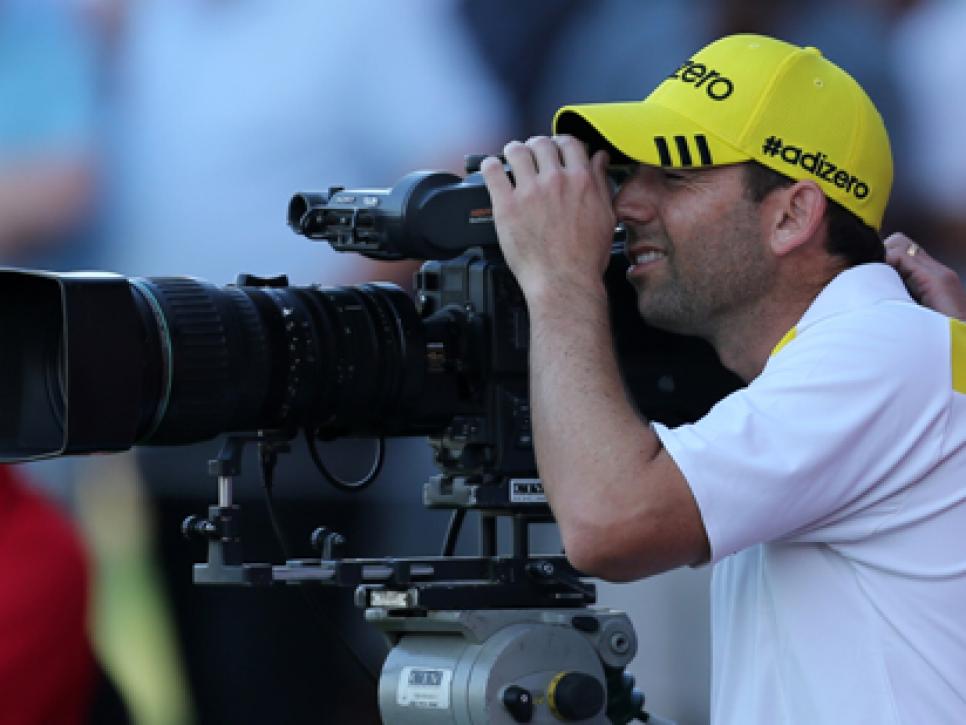News
If we're to discuss growing the game, we must look at those discussing it
By Derek Evers
More than a week has passed. The furor has died down. Everyone within golf's inner circle is breathing a sigh of relief that Tiger Woods didn't win the Masters. And thanks to a dramatic finish by a guy with movie star good looks, there were plenty of feel-good storylines to bury the lede on Woods' drop fiasco at the Masters. But as great as Adam Scott's sudden death playoff victory over Angel Cabrera was, the game of golf could use a mulligan.

It's time we turn the camera lens on ourselves. Photo: Karim Jaafar/Getty Images
It's easy to reflect on the excitement surrounding Tiger Woods' penalty -- as many have -- from a historical perspective: What would the greats of past generations do if in his situation? Would they withdraw despite being assessed a two-stroke penalty because it would preserve golf's tradition of "values"? Did Tiger Woods miss an opportunity to grow the game?
Yet, to talk about "growing the game of golf" requires an outsider's point of view -- an outsider who views much of the dialogue around golf as an echo chamber of (mostly) white (mostly) men questioning Tiger's mistake from a preemptive position of integrity.
I won't attempt to rehash everything that occurred on Friday and Saturday at the Masters, but if you're looking for a refresher, you can start here. As Nick Faldo repeated throughout the televised coverage, the modern era has given us a lot of gray area for rules interpretations. What is not in dispute, however, is that golf owes Tiger Woods -- at the very least -- the benefit of the doubt.
For better or worse, the 14-time major champion remains the face of the game to everyone without vested interest. And yet, as a thirtysomething fan holding the remote control, I watched Fred Ridley's press conference on Saturday morning devolve into a witchhunt for a scapegoat as those being paid to cover the sport demanded to know why the world's most famous golfer wasn't being kicked out of the world's most famous golf tournament. It was enough to make you think he was but a cog in the sport, not the man solely responsible for putting their stories on the front page.
These same journalists would later pen how ratings of the final round were up 26%, yet gloss over how it peaked about an hour before the telecast ended when Tiger's round was finishing up. This, by the way, has been case in every Masters he's played in. Think Adam Scott will captivate audiences that way? By comparison, weekend ratings for the years Zach Johnson (11.9) and Trevor Immelman (11.0) won the Masters surpassed the 10.2 ratings share we enjoyed in 2013. Not coincidentally, Tiger factored prominently in both of those final rounds.
Yet, despite every panicked cry about the state of the game, when given the opportunity to showcase the inclusion we want to believe golf employs, we step all over ourselves in an attempt to show how righteous we are.
Deadspin's Drew Magary accurately summed up the culpability when saying "Golf's self-congratulating rule-keeping is dumb. . . To anyone existing outside of that bubble, golf has a reputation for being elitist, racist, sexist, wasteful, expensive, and dickish -- a game played by cheaters, liars, crooks, frauds, and brats. It has no more integrity than any other sport, and this little Tiger episode has forcefully demonstrated the disconnect between how golf people feel about their sport and the reality of how it's played and by whom."
"Nicklaus and Jones would've withdrawn," tweeted one reporter. Another blamed the disconnect on a younger generation that doesn't feel a responsibility to adhere to golf's traditions. And Saturday's live telecast opened with 30-minutes of Jim Nantz in the Butler Cabin explaining why Tiger Woods was allowed to keep playing, paying no mind to the fact that Woods was actually on the course at that time. As someone following the story all morning, it seemed redundant. As a casual fan who was forced to wait until 3pm to see live coverage, it played out like water torture. It was enough to make you turn off the TV and go outside... And we might have... If Tiger Woods wasn't playing.
When the joy over Australia's first Masters victory subsides, and the conversation returns to the state of the game, I would implore everyone who reports on golf for a living to imagine themselves as someone who lives outside of golf's "bubble" fraternity -- and there are many -- watching the television coverage and seeing the game's only true superstar getting interrogated for hitting not one, but two shots of impeccable precision. In essence, for doing what he is paid millions of dollars to do. Even in loss, Tiger Woods demonstrated he is still the best at wielding a stick at a little white ball, and that is all anyone outside the game cares about.
-- Derek Evers is a Contributing Editor for GolfDigest.com.